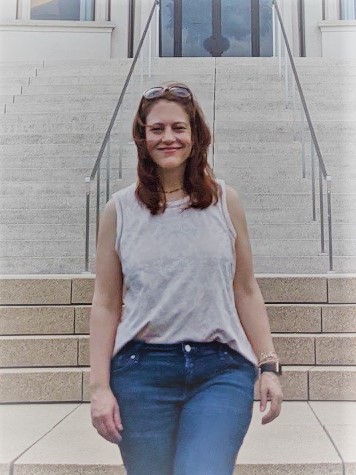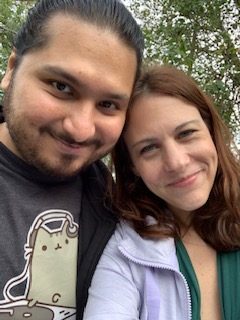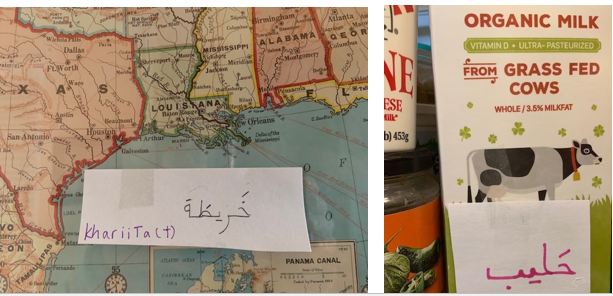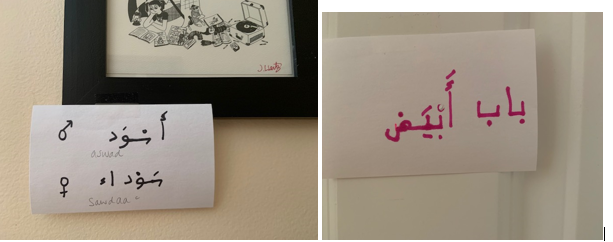My name is Denise Du Vernay, and I have been a staff member at Loyola since fall of 2018, but back in the fall of 2012, I had a very different life: I was starting my 18th year of teaching English after earning a master’s degree in literature at Florida State back in 2002. It was my first day at a small university on the south side, and there were, as usual, a few names on my roster I didn’t know how to pronounce. This time, the first one I encountered was Majed.
“I’m sorry—I’m not sure how to say this. My-yed?” I asked, hesitantly.
“Ma-JED,” a student in the second row with a curly brown ponytail and a mischievous grin said, “But you can call me ‘Jade.’”
Who would know Jade and I will be married at a different time and place!
Jade and his sister came to the United States to study in 2011. His English was already excellent when he got here, so we always speak English together. Before I knew him, I had never had an interest in Arabic, and when I was in high school and college, I studied Spanish (the only language offered in my high school) and then French. But when we visited his best friend’s family in Toronto a couple years ago and they all spoke Arabic together, I felt left out. It wasn’t that they were being rude; rather, I considered how I’d had seven years to learn some Arabic, and I could only count to three and tell the cat to stop it (“bis yaa bissa”). And, well, I felt I only had myself to blame. It also occurred to me that Jade is ridiculously funny – and if I find him so funny in English, imagine how funny he is in his first language! Culture and language are so tightly linked, and in order to know my husband and understand his family and background, I ask questions and listen to his stories. But as time in our relationship went on, I wanted more and more to understand when he Facetimes with his friends and family and make sense of the food packages that are in my own kitchen. (What is this—tea? parsley? oregano? Who knows? Best to just leave it alone!)
During the pandemic I have been working from home instead of my office at the Water Tower Campus. When it was announced that fall 2021 classes would be in person, it dawned on me that I might never have the chance again to take Arabic in a classroom and I should try to take advantage of this gift, to seek light in the darkness of a global pandemic. I am so fortunate to have a supervisor who is flexible and caring for her direct reports, wanting us to pursue our own interests and personal growth (I have not always been so blessed at other universities), and I was so lucky to be welcomed into Arabic 101 by ustaadha sawsan.
Immediately upon being in a classroom again as a student, not the teacher for the first time since the W. administration, some old instincts kicked in, as well as my love for learning. I didn’t remember how to study and memorize as well, but I had so much fun and enjoyed the invigoration of it all. My classmates were so welcoming to me, too, even though the Chuck Taylor sneakers I sometimes wore were older than they were. In time I got the hang of studying again thanks to some tips from my tutor Natalie, who showed me the mega spreadsheet of vocab she kept on a Google doc (which I promptly recreated on my own) and told me about how she put vocab Post-It notes on items around her apartment. The next day, I heard laughter coming from the kitchen when Jade opened the fridge and found I had put a Post-It with “Haliib” in both English letters and Arabic on the milk. And even harder laughter in our hallway when he discovered I’d misspelled a different word and inadvertently written something crass on a Post-It note which I’d stuck to our antique map of the USA. (Yes, it has since been corrected).
Over the last few months, I’ve learned that Arabic is a lovely and fascinating language, and while it’s certainly not always easy (I may have cried once or twice), the grammar and structure do make sense in many ways. I also enjoy finding the connections in words I already know and discovering that I can read some of the signs outside the shops on Devon Street.
What started as a desire to understand and know my husband better through his first language has turned into a desire to learn Arabic for myself and my own edification. I’m excited to continue with Arabic 102 in the spring semester, and mostly I’m so pleased about what I’ve learned about myself: I am a lifelong learner not afraid of new challenges.




